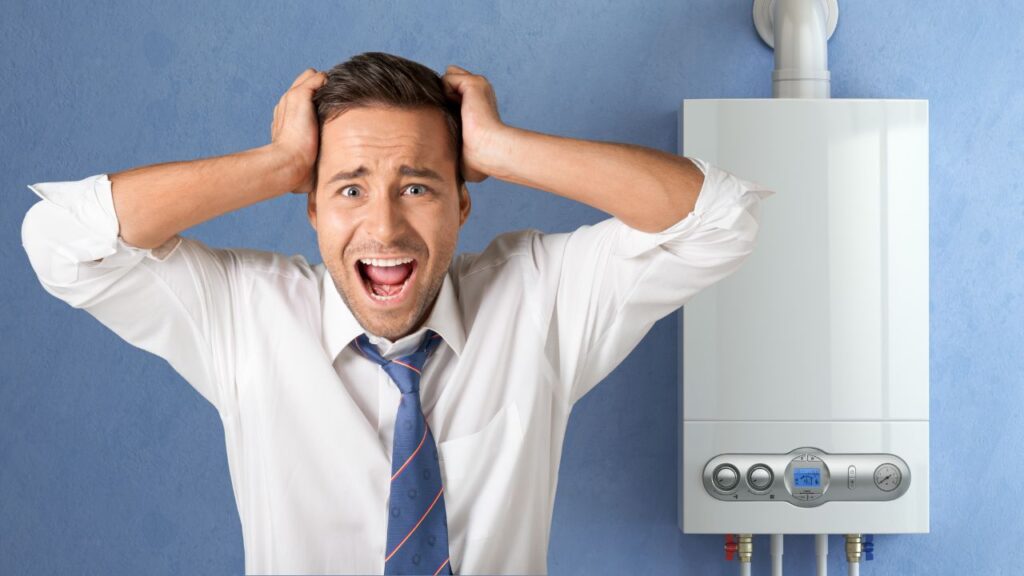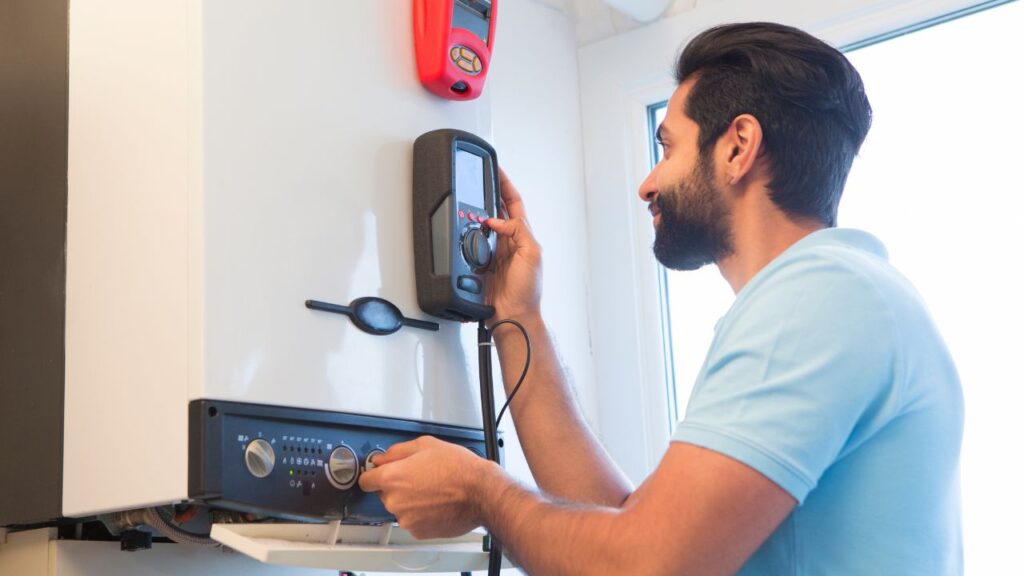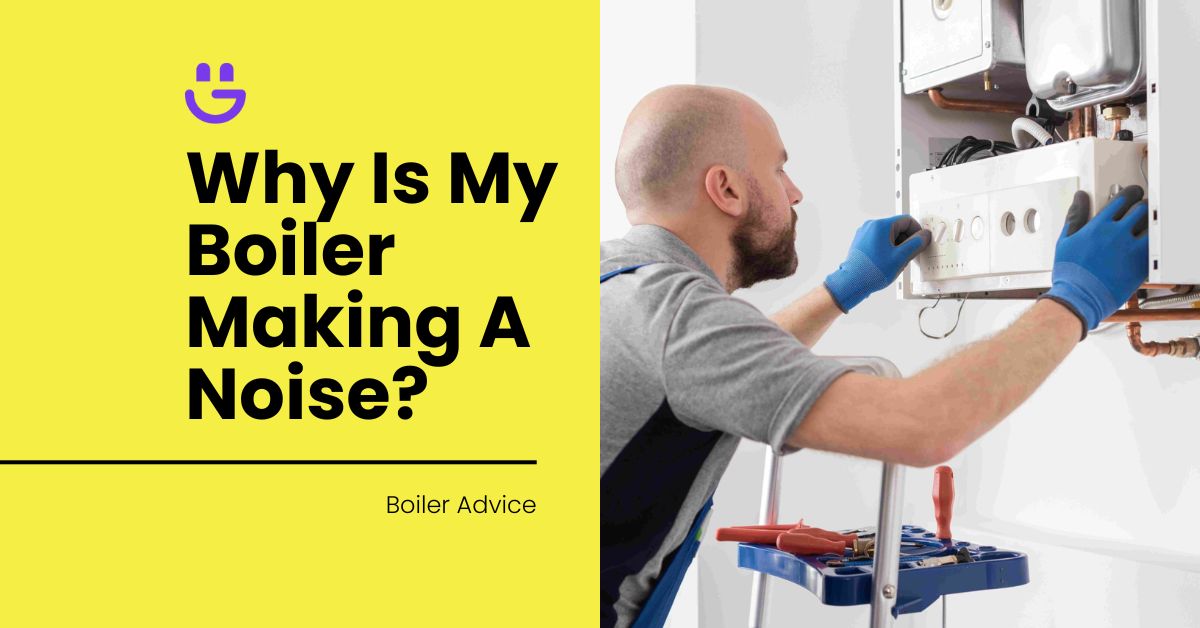Last Updated on January 27, 2025
Unusual noises from your boiler may indicate a pending breakdown, an inefficiency causing higher bills, or a potential hazard to the home. Whether you are a homeowner, tenant, or landlord, boiler noises are a concern. Often, however, the cause of the noise is not too serious and can be fixed without much trouble.
In this Eco Happy guide, we put noisy boilers under the microscope. No matter what disconcerting noise your boiler makes, we’ll look at causes and expert solutions for each. We’ll also highlight when you should call a professional heating engineer and when you may be able to address the racket yourself.

Contents
Common Boiler Noises
Let’s examine boiler noises and the boiler problems they typically indicate.
Banging
There are several reasons for banging noises and, while you need to address the problem, there is usually no need to be overly alarmed.
- Air in the heating system: Air trapped in the boiler or heating system can create pockets of pressure that cause your pipes to expand and contract beyond their usual limits. Pipes may even loosen and move around when hot water flows through them. A noisy banging or rumbling sound is often the result.
- Limescale buildup: Limescale tends to build up in the boiler’s heat exchanger, particularly if you live in a hard water area. This buildup restricts water flow, creates hotspots, and can cause the boiler to overheat. The banging noise you might hear, known as “kettling,” occurs when water boils inside the heat exchanger. Despite its name, the water in a boiler is not supposed to boil!
- Faulty thermostat: A malfunctioning boiler thermostat can’t regulate the boiler’s temperature effectively, which causes the water to overheat. This results in excessive pressure and rumbling or banging noises as the water overheats.
Banging boiler fixes
- Bleeding radiators will remove air pockets. You can do this yourself by switching off the boiler and opening the bleed valves with a radiator key to release air. A low hiss will confirm that air is escaping and being replaced by water. Keep bleeding the radiator until water runs from the valve.
- Power flushing or descaling the boiler can remove limescale buildup. It’s best to leave this to an expert.
- Checking and recalibrating the thermostat, or replacing it if necessary, should resolve thermostat problems. This should also be handled by a professional.
Gurgling or bubbling
Bubbling and gurgling noises coming from your boiler point to a few underlying complications. Here are possible diagnoses:
- Trapped air: One of the most common causes of bubbling or gurgling noises in a boiler is trapped air. Air can enter the system during initial installation, during maintenance, or if there’s a leak. The gurgling or bubbling sounds you hear are caused by air pockets disrupting the water flow.
- Low water pressure: In some cases, bubbling or gurgling noises may be related to low water pressure. The inadequate water flow due to low pressure manifests as a gurgling sound.
Gurgling boiler fixes
- Bleeding the radiators or the entire heating system will help remove air trapped in the boiler and radiators.
- You should check and adjust the boiler’s water pressure setting to ensure that the pressure is in the safe ‘green’ zone (between 1.5 and 2 bar when the heating is on, and between 1 and 1.5 bar when the boiler is off).
- A Gas Safe engineer may recommend a power flush to clear out sludge and debris and restore normal water flow.
Whistling like a kettle
What causes a boiler to whistle – sounding like a kettle coming to boil?
- Debris buildup: Rust, limescale, and other debris can clog your heat exchanger and related components over time. This debris and limescale causes the boiler to become overheated, which triggers the whistling sound known as ‘kettling’. Continual overheating will lead to cracks and broken seals in the heat exchanger, potentially causing leaks, so it’s important to keep on top of this.
- Malfunctioning pressure relief valve: The boiler’s pressure relief valve is a critical safety device that lowers excess pressure by releasing water and steam from the system. This prevents ruptures and leaks. A damaged pressure relief valve sometimes makes whistling, hissing, or popping sounds.
- Trapped air: Air trapped in the boiler or heating system is once again a culprit. When it disrupts the flow of water and creates turbulence, this manifests as a whistling noise.
Whistling boiler fixes
- Bleed your radiators.
- Sometimes, a good power flush to the system, throwing out old rusty water, will remedy the problem.
- A damaged pressure relief valve is a safety risk and requires immediate investigation and repair by a qualified engineer. You want to monitor your pressure gauge to ensure your pressure hasn’t jumped dangerously into the red.
Hissing
A hissing noise often indicates leaks in the boiler or pipework. Air trapped in the pipes and a faulty pressure relief valve are also sometimes responsible for hissing. However, this often accompanies dripping sounds.
- Leaks: Leaks are caused by various factors such as corrosion, worn seals, broken valves, and cracked joints. Pinhole leaks can result when the boiler pressure is too high. Read about repairing a boiler leak on Eco Happy’s website.
- Pressure relief valve: Hissing noises could be caused by a misfiring pressure relief valve. Boiler pressure problems would confirm this diagnosis.
Fixing a hissing boiler
- Identify the source of the hissing or dripping. Inspect all visible piping connected to the boiler for leaks or loose connections. Pay attention to joints, fittings, and valves. Look for drips, dampness, and puddles. If piping repairs are needed, you should call a qualified boiler engineer.
- Check your relief valve for leaks or signs of damage; consult an expert when needed.
Grinding
A grinding noise from your boiler is worrying. Grinding or harsh whining is usually a sign of mechanical issues with your unit. The compromised parts causing these strange noises include:
- Worn pump bearings: Boiler pump bearings struggling to support the weight and smooth movement of rotating parts will often make unnerving noises.
- Damaged impeller: The impeller is a rotating component inside the pump that circulates water through the system. A damaged or misaligned impeller often makes a grinding noise as it comes into contact with other parts.
- Damaged motor: Electrical faults, overheating, mechanical wear, and worn motor bearings all compromise the smooth operation of your boiler’s motor.
Grinding boiler fixes
- Tackling mechanical components like motors and pumps is best left to qualified technicians. A boiler engineer should perform a comprehensive inspection, identify the root cause, and recommend appropriate repairs or replacements.
Humming
You probably barely notice your boiler system operating normally at a low hum. It’s when the humming becomes loud and intrusive that you’ll have to investigate the cause.
- Boiler pump issues: A blocked or obstructed pump causes the motor to work harder than usual. A faulty pump will often run too fast. These pump issues typically lead to increased vibrations and humming noises.
- Loose components: Loose components within the boiler, such as fan blades and motor mounts, create vibrations that produce a humming noise. Worn bearings in the pump and motor can have the same effect.
- Motor problems: If the motor driving the boiler’s pump is malfunctioning or operating inefficiently, it may hum as it struggles to perform.
Humming boiler fixes
- Having a technician clear debris or blockages from the faulty pump helps to restore normal operation and resolve your noisy boiler problem.
- Simply tightening or securing loose components can eliminate a loud humming noise and prevent further damage.
- Motor problems result from various factors such as overheating, overload, or mechanical issues. These require professional inspection and repair.
Vibrating and whooshing
Perhaps you’ve heard your boiler make a vibrating or whooshing sound. Understanding what causes these symptoms goes a long way to reassuring yourself that your central heating system is not terminal.
- Blocked flue or intake pipe: The intake pipe and boiler flue help maintain proper ventilation and prevent the buildup of harmful gases indoors. The flue and air pipe typically lead from the boiler to outside the property.Leaves, debris, and even insect settlements can block the flue and intake vent. When you place your hand over the vents, you should feel air pass. If you don’t, there is likely a blockage.
- Dirty filter: Over time, dust and dirt can clog the filter restricting airflow and creating that same whooshing noise.
Whooshing boiler fixes
- Be sure to regularly inspect and clear the air intake vent and flue. If there is an obvious obstruction you can remove it yourself carefully.
- A dirty, clogged filter is best replaced by a technician.
Clicking
If your boiler is making clicking or tapping noises and battling to fire up, it points to an ignition problem. You will have to call an engineer to investigate and get the unit firing properly.
DIY Checks And Maintenance
If your boiler is making a noise, there are a few troubleshooting actions you can take yourself:
- Identify exactly where the noise is coming from. It could be the boiler unit, the boiler casing, the pipes, or the radiators.
- When you familiarise yourself with your boiler’s error codes and manufacturer’s manual, you can sometimes make quick, easy fixes.
- Inspect the unit for loose panels and screws that might be the source of rattling, vibration, or other noises. Tighten and fasten these.
- Inspect for loose wiring and consult an expert when necessary.
- Bleed your radiators.
- Check and adjust the water pressure gauge and add or remove water from the system.
- Check and clear external vents and pipes of blockages if you can reach them easily.

Is It Time for A New Boiler?
Sometimes, the issues causing a noisy boiler are so severe that you’ll need to have it replaced with a new boiler. Besides the cost of the unit, this means you’ll also have to pay installation fees.
To receive a free quote for a new boiler, simply complete our online form. Just answer a few quick questions, and we’ll provide you with a quote in minutes!
FAQs
Why is my boiler making a knocking noise when it starts up?
Knocking noises during startup could be caused by issues with the ignition system, burner, delayed ignition, or water hammer (sudden halting or redirecting of the flow). These complications usually require professional inspection to identify and repair.
How often should you service your boiler?
You should have your boiler serviced by a technician once a year to ensure it works efficiently and that potential problems are detected in good time.
Is a noisy boiler dangerous?
Inbuilt safety mechanisms should shut down a boiler before it becomes hazardous. However, especially with older gas boilers, unfamiliar noises may spell danger. It’s important to have a boiler engineer inspect an overly noisy unit.
Final Thoughts
Understanding the causes of a noisy boiler can reduce stress in your life, especially if there are quick easy fixes you can make. It’s vital to understand the fixes you can manage yourself and those that a professional like a Gas Safe engineer needs to attend to.
If your heating setup is a cacophony of different noises, it may be time to replace your boiler. For expert advice and personalised guidance about safe quiet heating, contact Eco Happy. We’re always happy to assist.






James Elston
Boiler Expert
James Elston is the top boiler replacement and heating expert at Eco Happy. He has over 20 years of experience in the industry, focusing on Gas Safe boiler installations and offering home-heating and energy-saving solutions to homeowners across the UK. From sourcing the most energy-efficient combi boiler to providing specialist heating advice, James ensures that Eco Happy maintains the highest standards and best customer service.